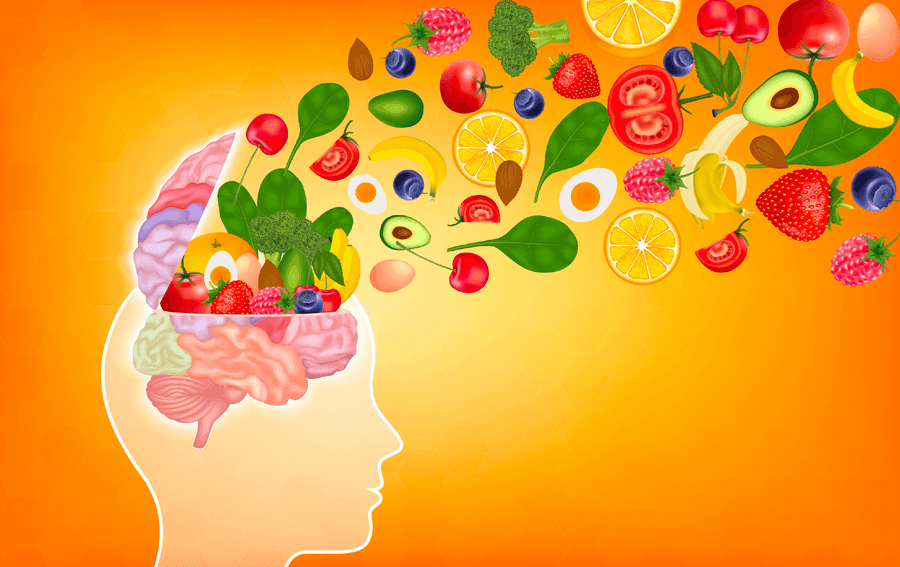What Foods Your Brain Needs
by by Danny Parr, M.S. CandidateNutrition
How does nutrition impact your brain?
The foods you eat provide energy and the nutrients you need to function, initiate immune responses, and live a long, healthy life. And the brain consumes more energy than any other organ in your body. The brain makes up only 2% of our body weight but 20% of the body’s metabolic load. [1] What this means is that the brain is more dependent and affected by inadequate nutrition. In addition, many nutrients have been identified that directly improve cognitive function, including omega-3 fatty acids, B vitamins, Vitamin D, Vitamin E, iron, and more. [2] But you don’t eat nutrients in isolation. What matters is your overall dietary pattern, or what foods you eat, how much of each food group, and how often.
What food groups slow cognitive decline?
A 2019 review found that higher adherence to the Mediterranean, DASH, or MIND diets is associated with less cognitive decline and a lower risk of Alzheimer’s. [3] What do these dietary patterns have in common? The Mediterranean diet is characterized by a high consumption of plant foods, including green leafy vegetables, legumes, nuts, fruits, and whole grains, with moderate consumption of alcohol. [4] The DASH diet also includes a high consumption of plant foods and additionally limits the consumption of saturated fats, total fat, cholesterol, and sodium. [5] Lastly, the MIND diet, which combines the Mediterranean diet and the DASH diet, emphasizes plant foods while limiting animal foods and foods high in saturated fats. [6]
Foods to eat more of:
- Berries (2 or more servings per week)
- Green leafy vegetables (1 or more servings per day)
- All other vegetables (1 or more servings per day)
- Nuts (5 or more servings per week)
- Beans (4 or more servings per week)
- Whole grains (3 or more servings per day)
- Fish (1 or more servings per week)
- Poultry (1 or more servings per week)
What food groups should you avoid?
While nutrients like total fat and sodium are to be limited, are there any food groups that should be avoided to protect our brain health? While some individual studies have found an association between saturated fat and cognitive decline, a systematic review found no significant associations between intake of different fatty acids and risk of AD. [7] What they did find was a reduction in mild cognitive impairment with the intake of omega-3 fatty acids, found in plant foods and fatty fish. Another review looked at meat consumption and found that the majority of studies showed no significant association with cognitive function or disorders. [8] While the MIND diet advocates for moderate alcohol consumption, a 2020 review of epidemiological studies concludes that there is insufficient evidence to support alcohol as protective for dementia or cognitive decline. [9]
There is one major group of foods that have been shown to negatively impact cognitive function: ultra-processed foods. A 2024 systematic review found that a high intake of ultra-processed foods was associated with an increased risk of dementia. [10] Ultra-processed foods are high in energy and lower in essential nutrients and can include confectionary sweets, sugar-sweetened beverages, and packaged ‘ready-meals’.
Foods to limit:
- Red meat (3 or fewer servings per week)
- Butter and margarine (less than 1 tbsp per day)
- Cheese (1 or fewer servings per week)
- Fried foods (1 or fewer servings per week)
- Sweets (3 or fewer servings per week)
Summary
According to the research, the most neuro-protective dietary pattern emphasizes whole plant foods such as green leafy vegetables, berries, nuts, and whole grains while limiting total fat, sodium, and ultra-processed foods. While alcohol has been previously touted as protective, the evidence remains inconclusive, and more research is needed. If you want to learn more about how to incorporate protective foods and optimize brain health, a Registered Dietitian could help with sorting out which factors are most necessary for you to implement and which can be implemented at a later time, or not at all. To make an appointment with a dietitian at the Amos Institute, contact us today.
References
- Kety, 1957: Metabolism of the nervous system.
- Gómez-Pinilla et al, 2008: http://doi.org/10.1038/nrn2421
- Van den Brink et al, 2019: https://doi.org/10.1093/advances/nmz054
- Bach-Faig et al, 2011: https://doi.org/10.1017/S1368980011002515
- Appel et al, 1997: https://doi.org/10.1056/NEJM199704173361601
- Morris et al, 2015: https:/doi.org/10.1016/j.jalz.2015.04.011
- Zhu et al, 2021: https://doi.org/10.1016/j.nut.2021.111355
- Zhang et al, 2020: https://doi.org/10.3390/nu12051528
- Wiegmann et al, 2020: https://doi.org/10.2147/NDT.S198772
- Henney et al, 2024: http://doi.org/10.1007/s00415-023-12033-1